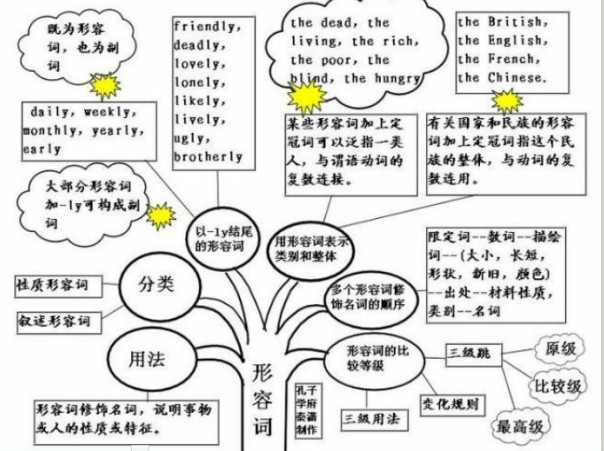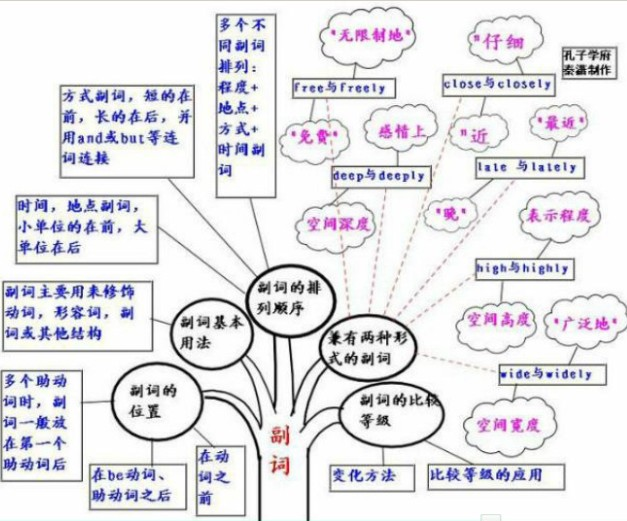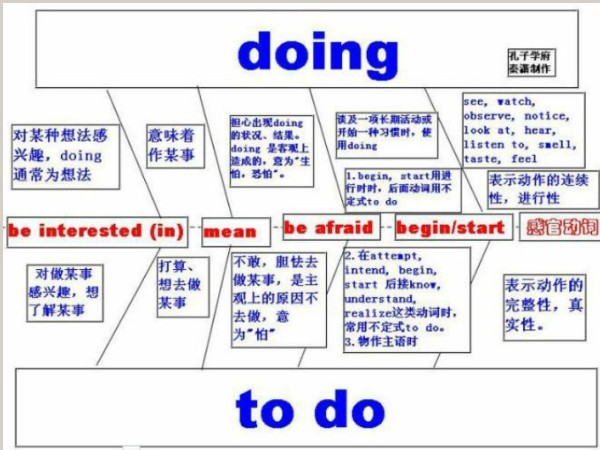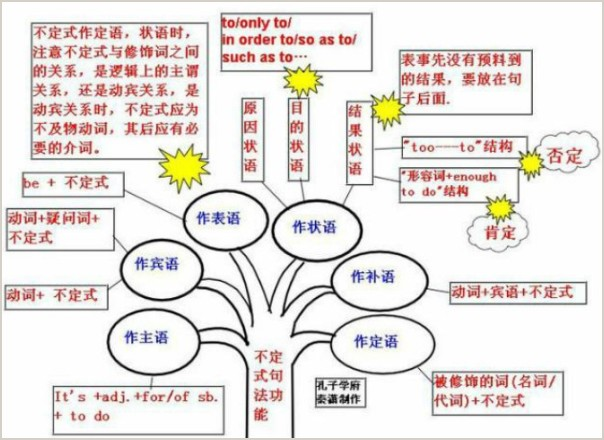本试题 “单词填空1. In many places today people _____ (request) not to smoke in the office.2. He is fond of _____ (play) all kinds of roles in his life.3. A...” 主要考查您对日常用语、谚语
形容词
副词
介词和介词短语
动名词
不定式
一般将来时的被动语态
一般现在时的被动语态
等考点的理解。关于这些考点您可以点击下面的选项卡查看详细档案。
- 日常用语、谚语
- 形容词
- 副词
- 介词和介词短语
- 动名词
- 不定式
- 一般将来时的被动语态
- 一般现在时的被动语态
日常用语的概念:
日常用语就是日常生活中的交际用语,如:Thank you. Sorry.等
谚语是人们生活中常用的现成的话。谚语类似成语,但口语性强,通俗易懂,而且一般都表达一个完整的意思,形式上差不多都是一两个短句。
例如:He laughs best who laughs last. 谁笑到最后,谁就笑得最好。
No pains, no gains. 没有付出,就没有收获。
怎样学好英语交际日常用语:
推荐坚持“多说”、“多听”、“多读”、“多写”,那么你的英语成绩肯定会很出色。
一、多“说”:
自己多创造机会与英语教师多讲英语,见了同学,尤其是和好朋友在一起时尽量用英语去问候,谈心情……这时候你需随身携带一个英汉互译小词典,遇到生词时查一下这些生词,也不用刻意去记,用的多了,这个单词自然而然就会记住。千万别把学英语当成负担,始终把它当成一件有趣的事情去做。或许你有机会碰上外国人,你应大胆地上去跟他打招呼,和他谈天气、谈风景、谈学校……只是别问及他的年纪,婚史等私人问题。尽量用一些你学过的词汇,句子去和他谈天说地。不久你会发现与老外聊天要比你与中国人谈英语容易的多。因为他和你交谈时会用许多简单词汇,而且不太看重说法,你只要发音准确,准能顺利地交流下去。只是你必须要有信心,敢于表达自己的思想。如果没有合适的伙伴也没关系,你可以拿过一本书或其它什么东西做假想对象,对它谈你一天的所见所闻,谈你的快乐,你的悲伤等等,长此坚持下去你的口语肯定会有较大的提高。
二、多“听”:
寻找一切可以听英语的机会。别人用英语交谈时,你应该大胆地去参与,多听听各种各样人的发音,男女老少,节奏快的慢的你都应该接触到,如果这样的机会少的话,你可以选择你不知内容的文章去听,这将会对你帮助很大,而你去听学过的课文的磁带,那将会对你的语言语调的学习有很大的帮助。
三、多“读”:
“读”可以分为两种。一种是“默读”。每天给予一定时间的练习将会对你提高阅读速度有很大的好处,读的内容可以是你的课本,但最好是一些有趣的小读物,因为现在的英语高考越来越重视阅读量和阅读速度。每道题的得分都与你的理解程度有很大关系,所以经过高中三年阅读的训练后,你必定会在高考中胜券在握。另一种是“朗读”这是学语言必不可少的一种学习途径。
四、多“写” :
有的同学总是抱怨时间紧,根本没时间写作文。其实“写”的形式很多,不一定就写作文才提高写作能力。比如写下你一天中发生的一些重要的事情,或当天学了某一个词组,你可以创设一个语境恰如其份地用上这个词。这样即可帮你记住这个词的用法,又可以锻炼你的写作能力学习英语不用花大块的时间,10分钟的散步可以练"说",吃完饭后可以读一会儿英语小说,睡前听几分钟英语,可以使你得到更好地休息……只要你每天抽出一些时间来练英语,你的英语成绩肯定会很快提高的。
和雨有关的谚语:
1、Save for a rainy day 未雨绸缪
例句:We save money for a rainy day.
2、It never rains but it pours 不雨则以,一雨惊人
例句:I just got sacked and my wife left me!So it never rains but it pours!
3、right as rain 身体健康,一切正常
例句:I was sick, but now I feel as right as rain.
和云有关的谚语:
1、on cloud nine 飘飘然如上九重天
例句:She passed the auditon and now she is on cloud nine.
2、head in the cloud 不切实际,好高骛远
例句:You can't always have your head in the cloud, you need to be down-to-earth.
和彩虹有关的谚语:
1、chase rainbows 做白日梦
例句:Chsing rainbows won't get you anywhere.
和风有关的谚语:
1、sail close to the wind 冒险
例句:If you believe what he said, you are sailing close to the wind.
2、know which way the wind blows 了解情况
例句:He never tells his thoughts until he knows which way the wind blows.
和雪有关的谚语:
1、be snowed down 工作太多做不过来
例句:I've been snowed down by my work!
2、white as snow 纯洁无辜
例句:The accused didn't comitt the murder,he is as white as snow。
和天气有关的谚语:
fair-weather friend 泛泛之交
形容词的概念:
形容词(adjective),简称adj.或a,形容词用来修饰名词或代词,表示人或事物的性质、状态,和特征的程度好坏与否,形容词在句中作定语、表语、宾语补足语。通常,可将形容词分成性质形容词和叙述形容词两类,其位置不一定都放在名词前面。
形容词的作用与位置:
形容词是用来修饰名词的,常被放在名词前作定语,或放在系动词后面作表语。以下属几种特殊情况,须牢记;
(1)形容词短语作定语,定语后置。
如:a language difficult to master,
a leaning tower about 180 feet high
(2)表语形容词(afraid、alike、alone、asleep、awake、alive等)作定语,定语后置。如a man alive。有些表身体健康状况的形容词如well、faint、ill只作表语。sick既可作表语又可作定语,ill如作定语意为“bad”。
(3)用作定语,修饰由不定代词one、no、any、some和every构成的复合词如anything、something等时,通常后置。
如:I have something important to tell you.
(4)else常用作疑问代词和不定代词的后置定语。
(5)enough、nearby修饰名词前置或后置,程度副词一般位于形容词、副词前面,enough修饰形容词、副词时,必须后置。
(6)几个并列的形容词作定语,其语序通常为:限定语(The、A)+描绘性形容词+size(大小)+shape(形状)+age(年龄、时间)+color(颜色)+origin(国籍、来源)+material(材料)+purpose(目的)+名词。
口诀:
限定描绘大长高,形状年龄和新老;颜色国籍跟材料,作用类别往后靠。
如:a heavy black Chinese steel umbrella,
the man's first tow interesting little red French oil paintings
形容词的用法:
1、形容词修饰名词,说明事物或人的性质或特征。通常,可将形容词分成性质形容词和叙述形容词两类,其位置不一定都放在名词前面:
1)直接说明事物的性质或特征的形容词是性质形容词,它有级的变化,可以用程度副词修饰,在句中可作定语、表语和补语。例如:hot热的。
2)叙述形容词只能作表语,所以又称为表语形容词。这类形容词没有级的变化,也不可用程度副词修饰。
大多数以a开头的形容词都属于这一类。例如:
afraid害怕的。(错)Heisanillman. (对)Themanisill. (错)Sheisanafraidgirl. (对)Thegirlisafraid.
这类词还有:well,unwell,ill,faint,afraid,alike,alive,alone,asleep,awake等。
3)形容词作定语修饰名词时,要放在名词的前边。但是如果形容词修饰以-thing为字尾的词语时,要放在这些词之后。例如:somethingnice
2、用形容词表示类别和整体:
1)某些形容词加上定冠词可以泛指一类人,与谓语动词的复数连接。如:the dead,the living,the rich,the poor,the blind,the hungry The poorarelosinghope.穷人失去了希望。
2)有关国家和民族的形容词加上定冠词指这个民族的整体,与动词的复数连用。如:the British,the English,the French,the Chinese. The English have wonderful senseofhumor.
以-ly结尾的形容词:
1)大部分形容词加-ly可构成副词。但friendly,deadly,lovely,lonely,likely,lively,ugly,brotherly,仍为形容词。改错:
如:(错)She sang lovely.
(错)He spoke to me very friendly.
(对)Her singing was lovely.
(对)He spoke to me in a very friendly way.
2)有些以-ly结尾既为形容词,也为副词。 daily,weekly,monthly,yearly,early .
如:The Times is a daily paper.
The Times is published daily.
形容词知识体系:

复合形容词的构成:
(1)形容词+名词+ed:
如:kind-hearted 好心的,white-haired 白发的
(2)形容词+形容词:
如:red-hot 炽热的,dark-blue 深蓝的
(3)形容词+现在分词:
如:good-looking 好看的,easy-going 随和的
(4)副词+现在分词:
如:hard-working 勤劳的,fast-moving 快速转动的
(5)副词+过去分词:
如:hard-won 得来不易的,newly-made 新建的
(6)名词+形容词:
如:life-long 终生的,world-famous 世界闻名的
(7)名词+现在分词:
如:peace-loving 爱好和平的,fun-loving 爱开玩笑的
(8)名词+过去分词:
如:snow-covered 白雪覆盖的,hand-made 手工的
(9)数词+名词+ed:
如:four-storeyed 4层楼的,three-legged 3条腿的
(10)数词+名词(名词用单数):
如:ten-year 10年的, two-man 两人的
副词的概念:
副词是指在句子中表示行为或状态特征的词,用来修饰动词、形容词、其他副词、介词短语、非谓语动词乃至整个句子,表示时间、地点、程度、方式等概念。
副词的位置:
1)在动词之前。
2)在be动词、助动词之后。
3)多个助动词时,副词一般放在第一个助动词后。
注意:
a. 大多数方式副词位于句尾,但宾语过长,副词可以提前,以使句子平衡。
如:We could see very clearly a strange light ahead of us.
b. 方式副词well,badly糟、坏,hard等只放在句尾。
如:He speaks English well.
副词的排列顺序:
1)时间,地点副词,小单位的在前,大单位在后。
2)方式副词,短的在前,长的在后,并用and或but等连词连接。
如:Please write slowly and carefully.
3)多个不同副词排列:程度+地点+方式+时间副词。
注意:副词very可以修饰形容词,但不能修饰动词。
改错:(错)I very like English.
(对)I like English very much.
注意:副词enough要放在形容词的后面,形容词enough放在名词前后都可。
如:I don't know him well enough.
There is enough food for everyone to eat.
There is food enough for everyone to eat.
兼有两种形式的副词:
1)close与closely:
close意思是“近”;closely意思是“仔细地”。
如: He is sitting close to me.
Watch him closely.
2)late与lately:
late意思是"晚";lately意思是“最近” 。
如:You have come too late.
What have you been doing lately?
3)deep与deeply:
deep意思是“深”,表示空间深度;deeply时常表示感情上的深度,“深深地” 。
如:He pushed the stick deep into the mud.
Even father was deeply moved by the film.
4)high与highly:
high表示空间高度;highly表示程度,相当于much。
如:The plane was flying high.
I think highly of your opinion.
5)wide与widely:
wide表示空间宽度;widely意思是“广泛地”,“在许多地方”。
如:He opened the door wide.
English is widely used in the world.
6)free与freely:
free的意思是“免费”;freely的意思是“无限制地”。
如:You can eat free in my restaurant whenever you like.
You may speak freely, say what you like.
副词知识体系:

介词和介词短语的概念:
介词是一种用来表示词与词、词与句之间的关系的虚词,在句中不能单独作句子成分。介词后面一般有名词、代词或相当于名词的其他词类,短语或从句作它的宾语。介词和它的宾语构成介词词组,在句中作状语,表语,补语或介词宾语。介词可以分为时间介词、地点介词、方式介词和其他介词。
误用介词的三种情况:
1、多用介词:
多用介词可能是受汉语意思的影响将及物动词误用作不及物动词,也可能是受相关结构的影响而用错:
误:We discussed about the plan.
正:We discussed the plan. 我们讨论了计划。
误:Did he mention about the accident?
正:Did he mention the accident? 他提到那次事故了吗?
误:I saw her enter into the bank.
正:I saw her enter the bank. 我看见她进了银行。
误:He married with[to] a nurse.
正:He married a nurse. 他同一位护士结了婚。
误:How can contact with you?
正:How can contact you? 我怎么与你联系?
误:We should serve for the people heart and soul.
正:We should serve the people heart and soul. 我们应该全心全意地为人民服务。
误:Who controls over the factory? (但名词control可接over)
正:Who controls the factory? 谁管理这个工厂?
误:He has a great many of friends here. (比较a great number of)
正:He has a great many friends here. 他在这儿有很多朋友。
2、漏用介词:
漏用介词可能是受汉语意思的影响将不及物动词误用作及物动词,或是受相关结构的影响的影响而用错等:
误:This matter is difficult to deal. (deal with=处理)
正:This matter is difficult to deal with. 这事很难处理。
误:He is not a man to be depended.
正:He is not a man to be depended on. 他不是个可靠的人。
误:He took a cup of tea, and went on the story.
正:He took a cup of tea, and wentonwiththestory.他喝了一口茶,又接着讲故事。
误:My mother still regards me a child. (比较consider…as中的as可省略)
正:My mother still regards me as a child. 我母亲还把我当小孩看。
误:They insisted sending a car over to fetch us.
正:They insisted on sending a car over to fetch us.他们坚持要派车来接我们。
误:What he says is worth listening.
正:What he said is worth listening to.他的话值得一听。
3、错用介词:
错用介词的情况比较复杂,可能是因受汉语意思的而错,也可能是因弄不清搭配关系而错,可能是混淆用法而错,也可能是受相关结构的影响而错,可能是忽略语境而错,也可能是想当然的用错:
误:She called on his office yesterday. (call on+人,call at+地点)
正:She called at his office yesterday. 她昨天去了他办公室拜访。
误:He is engaged with a nurse.
正:He is engaged to a nurse.他与一位护士订了婚。
误:The sun rises from the east.
正:The sun rises in the east.太阳从东方升起。
误:Under his help, I finished it in time.
正:With his help, I finished it in time. 在他的帮助下,我及时做完了。
误:During he was in Japan, he visited many places.
正:During his stay in Japan, he visited many places.他在日本期间,参观过许多地方。
误:We are familiar to his character.
正:We are familiar with his character.我们了解他的性格。
误:Help yourself with the fruit.
正:Help yourself to the fruit.吃点水果吧。
介词的宾语:
1、名词或代词作介词宾语:
如:Are you interested in history? 你对历史感兴趣吗?
Don't worry about it. 别为它担心。
注:若是人称代词用作介词宾语,要注意用宾格。
如:No one can sing like her. 没有人能像她那样唱歌。(不能用like she)
2、动名词作介词宾语:
如:He is good at telling stories. 他善于讲故事。
In crossing the street he was run over. 他在穿过马路时被汽车撞倒。
3、过去分词作介词宾语:
如:We can't regard the matter as settled. 我们不能认为这事已经解决。
I take it for granted you have read the book. 我以为你读过这本书。
注:过去分词用作介词宾语通常只见于某些固定结构中,如上面第1句涉及regard…as(认为…是)结构,第2句涉及take sth for granted(认为某事属实)。在其他情况下,介词后通常不直接跟过去分词作宾语,若语义上需要接过去分词(表被动),可换用“being+过去分词”:
如:He went out without being seen by the others.他出去了,没有被其他人看见。
4、从句作介词宾语:
如:He was not satisfied with what she said. 他对她说的不满意。
I'm worried about where he is. 我担心他上哪儿去了。
注:介词后通常不接that从句,遇此情况需考虑用其他结构:
误:He paid no attention to that she was poor.
正:He paid no attention to the fact that she was poor. 他根本不注意她很穷这一事实。
但有个别介词(如except)可接that从句。
比较:I know nothing about him except that he lives next door./I know nothing about him except for the fact that he lives next door. 我只知道他住在隔壁,其它的就不知道了。
5、不定式作介词宾语:
如:I had no choice but to wait. 除了等,我没有别的选择。
He wanted nothing but to stay there. 他只想留在那儿。
They did nothing but complain. 他们老是一个劲地抱怨。
He never did anything but watch TV. 除了看电视,他从不干任何事。
注:(1)介词后接不定式的情形通常只见于but, except等极个别个词。该不定式有时带to,有时不带to,其区别是:若其前出现了动词do,其后的不定式通常不带to;
若其前没有出现动词do,则其后的不定式通常带to。
(2)介词后虽然通常不直接跟不定式作宾语,但却可接“连接代词(副词)+不定式”结构:
如:He gave me some advice on how to do it. 对于如何做这事他给我提了些建议。
6、形容词作介词宾语:
如:Her pronunciation is far from perfect. 她的语音远不是完美的。
In short, we must be prepared. 总而言之,我们要有准备。
Things have gone from bad to worse. 事情越来越糟。
注:(1)有些形容词用作介词宾语可视为其前省略了动名词being:
如:He regarded the situationas(being) serious. 他认为形势严重。
His work is far from(being) satisfactory. 他的工作丝毫不令人满意。
(2)有些“介词+形容词”的结构已构成固定搭配:in full全部地,全面地,无省略地; in private私下地,秘密地; in particular特别地;in general一般地,通常地,概括地; in brief 简言之;in short总之,简言之; in vain徒然地,徒劳无益地;for fee免费地,无偿地; for certain肯定地,确切地;for sure肯定地,确切地; for short为了简短,简称;atl arge自由自在地,逍遥法外; by far…得多
7、副词作介词宾语:
如:I can't stay for long. 我不能久呆。
It's too hot in here. 这里面太热了。
I looked every where except there. 除了那儿,我到处都看过了。
8、数词作介词宾语:
如:The city has a population of four million. 这座城市有四百万人口。
He was among the first to arrive. 他是第一批到的。
9、介词短语作介词宾语:
如:Choose a book from among these. 从这些书中选一本吧。
I saw her from across the street. 我从街的对面望见了她。
注:通常可后接介词短语作宾语的介词是from, till, until, since, except, instead of等。
比较:I took it from the bed. 我从床那儿(或床上)拿的。
I took it from under the bed. 我从床下拿的。
10、复合结构用作介词宾语:
如:She had no objection to Mary marrying him. 她不反对玛丽与他结婚。
She came in with a book in her hand. 她手里拿着一本书走了进来。
All the afternoon he worked with the door locked. 整个下午他都锁着门在房里工作。
介词短语的句法功能:
1、表语:
如:He was with a friend. 他和一个朋友在一起。
Health is above wealth. 健康胜过财富。
This knife is for cutting bread. 这把小刀是用于切面包的。
注:有些介词(如because of)引出的短语通常只用作状语,不用作表语:
误:His absence is because of the rain.
正:His absence is due to the rain. 他因雨未来。
但是,若主语是代词(不是名词),becauseof引出的短语可用作表语:
如:It is because of hard work. 那是因为辛苦工作的原因。
2、状语:
如:Don't touch it with your hands. 别用手去摸它。
Did you do this by design or by accident? 你这样做是有意的还是无意的?
3、定语:
如:This is his reply to your letter. 这是他给你的回信。
This is the best way of doing it. 这是做此事最好的方法。
My love for you is deeper than the sea. 我对你的爱比海深。
4、宾语补足语:
如:I found everythingin good condition. 我发现一切正常。
Her illness kept her in bed for a week. 她因生病在床上躺了一星期。
注:用作宾语补足语的介词短语在相应的被动语态中则为主语补足语:
如:He was regarded as a hero. 他被看成是英雄。
5、宾语:
如:A man stepped out from behind the wall. 一个人从墙后走出来。
He cannot spare anytime except on Sunday. 除星期日外,他抽不出时间。
6、主语:
如:Between6 and 7 suits me. 六点到七点对我比较适合。
After the exams is the time to relax. 考试后是轻松一下的时间。
注:介词短语通常不用作主语,尽管有时也像上面这样用作主语,但通常可视为是在一定的上下文中有所省略:
如:—When are we going to have the next meeting? 我们下次什么时候见面?
—On Tuesday may be convenient. 星期二可能比较方便。
此句中onTuesday虽用作主语,但可视为是其前省略了meeting一词:
即:Meeting during the vacation may be convenient.
动名词概念:
动名词是一种兼有动词和名词特征的非限定动词。它可以支配宾语,也能被副词修饰,动名词有时态和语态的变化。
现在分词和动名词用法比较:
动词的-ing形式包括现在分词和动名词两种形式。他们的句法功能如下:
动词的-ing形式如果作句子的主语或者宾语时,应该是动名词形式;如果作补语或者状语时,应该是现在分词形式。那么作表语或者定语的动名词和现在分词又该怎样区分呢?
1、动名词与现在分词作表语时的比较:
(1)动名词作表语说明主语的内容,回答what的问题;现在分词作表语相当于形容词作表语,说明主语的性质、特征等,回答how的问题。
如:One of the best exercises is swimming. 游泳是最好的运动项目之一。
What pleases him most is bathing in the sea. 最使他高兴的事是在海中沐浴。
The situation both at home and abroad is very in-spiring. 国内外的形势都很鼓舞人心。
The color is pleasing to the eye. 颜色悦目。
(2)动名词作表语,表语和主语几乎处于同等地位,可以互换位置,其句意不变;现在分词作表语,表语和主语则不能互换位置。
如:Our work is serving the people.
(=Serving the people is our work.)我们的工作是为人民服务。
The news was disappointing. 那消息令人失望。
(3)作表语的现在分词前可以用very,quite,rather,greatly等副词修饰,而动名词则不可以。
如:What he said was very encouraging. 他的话很鼓舞人心。
Our goal is realizing the four modernizations in the near future. 我们的目标是在不久的将来实现四个现代化。
(4)现在分词与形容词一样可以和more,the most构成形容词的比较级和最高级,而动名词则不可以。
如:The story is the most fascinating. 那个故事最迷人。
(5)作表语用的现在分词除了和be连用以外,还可以和其它的系动词连用;而作表语的动名词则通常只能和be连用。
如:His speech seems inspiring.他的演讲似乎很鼓舞人心。
His interest is writing for the news papers. 他的爱好是给报社写文章。
(6)有些用作表语的现在分词已经形容词化了。常见的有:exciting,moving,inspiring,missing,interesting,disappointing等。
2、动名词与现在分词作定语时的比较:
(1)动名词作定语时,表示它所修饰的名词的性能和用途,和它所修饰的名词在逻辑上没有主谓关系;
现在分词作定语时,表示它所修饰的名词正在进行的动作,和它所修饰的名词在逻辑上有主谓关系,常可以扩展成一个定语从句。
如:a swimming girl=a girl who is swimming 一个在游泳的姑娘
a walking stick=a stick that is used for walking 一根拐杖
(2)现在分词作定语有时可以后置,而动名词则通常只能放在它所修饰的名词之前。
如:The girl wearing glasses is one of his students. 戴眼镜的那个女孩是他的一个学生。
I bought some reading materials. 我买了一些阅读材料。
动名词的用法:
1、作主语:
例如:Fighting broke out between the South and the North. 南方与北方开战了。
2、作宾语:
a. 有些动词可以用动名词作宾语。
例如:admit承认 appreciate感激 avoid避免 complete完成 consider认为 delay耽误 deny否认 detest讨厌 endure忍受 enjoy喜欢 escape逃脱 fancy想象 finish完成 imagine想象 mind介意 miss想念 postpone推迟 practice训练 recall回忆 resent讨厌 resume继续 resist抵抗 risk冒险 suggest建议 face面对 include包括 stand忍受 understand理解 forgive宽恕 keep继续
例如:Would you mind turning down your radio a little, please? 你把收音机音量调小一点,好吗?
The squirrel was lucky that it just missed being caught. 这松鼠幸运得很,刚逃避了被逮住的厄运。
b. 有些结构后面可以用动名词作宾语或其他成分。
例如:admit to prefer...to burst out keep on insist on count on set about put off be good at take up give up be successful in be used to lead to devote oneself to object to stick to no good no use be fond of look forward to be proud of be busy can't help be tired of be capable of be afraid of think of
3、作表语,对主语说明、解释:
例如:Her job is washing, cleaning and taking care of the children. 她的工作是洗刷、清扫和照顾孩子。
比较:She is washing, cleaning and taking care of the children.
4、作定语,一般表示所修饰名词事物的用途:
例如:a writing desk=a desk for writing 写字台
a swimming pool=a pool swimming 游泳池
有些动名词作定语,与所修饰的名词关系比较复杂。
例如:boiling point=a temperature point at which something begins to boil 沸点
a walking tractor=a tractor which a driver can operate while he or she is walking behind it 手扶拖拉机
动名词知识体系:

动名词与不定式用法对比:

动词不定式的概念:
动词不定式指由to加上动词原形(而且只能是动词原形)所构成的一种非限定性动词,但在有些情况下to可以省略。动词不定式在语法功能上可作主语、宾语、宾语补足语、
表语、定语和状语。
不定式的特殊句型对比:
1、不定式的特殊句型too…to…:
1)too…to 太…以至于…。
例如:He is too excited to speak. 他太激动了,说不出话来。
—Can I help you? 需要我帮忙吗?
—Well, I'm afraid the box is too heavy for you to carryi t, but thank you all the same. 不用了。这箱子太重,恐怕你搬不动。谢谢。
2)如在too前有否定词,则整个句子用否定词表达肯定,too后那个词表达一种委婉含义,意为“不太”。
例如:It's never too late to mend. 改过不嫌晚。(谚语)
3)当too前面有only, all, but时,意思是:非常…等于very。
例如:I'm only too pleased to be able to help you. 能帮助你我非常高兴。
He was but too eager to get home. 他非常想回家。
2、不定式的特殊句型so as to:
1)表示目的:它的否定式是so as not to do。
例如:Tom kept quiet about the accident so as not to lose his job. 汤姆对事故保持沉默是为了不丢掉他的工作。
Go in quietly so as not to wake the baby. 轻点进去,别惊醒了婴儿。
2)表示结果:
例如:Would you be so kind as to tell me the time? 劳驾,现在几点了。
3、不定式的特殊句型:Why not:
“Whynot+动词原形”表达向某人提出建议,翻译为:为什么不……? 干吗不……?
例如:Why not take a holiday?
不定式的用法:
1、不定式作补语:
1)有些有动词+宾语+不定式的结构。
例如:advise allow cause challenge command compel drive驱使
enable encourage forbid force impel induce instruct invite like/love order permit make let have want get warn persuade request send tell train urge 等。
例如:Father will not allow us to play on the street. 父亲不让我们在街上玩耍。
The officer ordered his men to fire. 长官命令士兵开火。
注意:有些动词如make,have,get,want等可用不定式作做宾补,也可用分词作宾补。现在分词表达主动,也表达正在进行,过去分词表达被动。
2)有些有动词+宾语+不定式的结构,不定式的动词往往是be,不定式一般可以省去。
例如:consider find believe think declare(声称) appoint guess fancy(设想) guess judge imagine know 等。
例如:We believe him to be guilty. 我们相信他是有罪的。
We know him to be a fool. 我们知道他是个笨蛋。(tobe不能省去)
典型例题:Charles Babbage is generally considered___the first computer.
A. to invent
B. inventing
C. to have invented
D. having invented
答案:C. 一般没有consider+宾语+be以外不定式的结构,也没有consider+宾语+doing的结构,排除A、B、D。consider用动词be以外的不定式作宾补时,一般要求用不定式的完成式,故选C。 3)有些动词可以跟there+to be的结构。例如:believe expect intend like love mean prefer want wish understand 等。
例如:We didn't expect there to be so many people there. 我们没料到会有那么多人在那里。
You wouldn't want there to be another war. 你不至于想让另外一场战争发生吧。
2、不定式作主语:
不定式作主语,往往用it作形式主语,真正的主语不定式放至句子的后面。
例如:It's so nice to hear your voice. 听到你的声音真高兴。
It's necessary for you to lock the car when you do not use it. 不用车的时候,锁车是有必要的。
It's very kind of you to help us. 他帮助我们,他真好。
It seemed selfish of him not to give them anything. 他不给他们任何东西,这显得太自私了。
3、不定式作表语:
不定式可放在be动词后面,形成表语。
例如:My work is to clean the room every day. 我的工作是每天清扫房间。
His dream is to be a doctor. 他的梦想是成为一名医生。
4、不定式作定语:
不定式做定语通常要放在被修饰的词后,往往表示未发生的动作。
例如:I have a lot of work to do.我有许多事要做。
There was nothing to bring home that morning. 那天早上(他回家时)两手空空。
5、不定式作状语:
1)目的状语:常用结构为to do,only to do(仅仅为了), in order to do,so as to do,so(such)...asto…(如此…以便…)。
例如:He ran so fast as to catch the first bus. 他飞快地跑以便赶上第一班车。
I come here only to say good-bye to you. 我来仅仅是向你告别。
2)作结果状语,可以表示没有预料到的或事与愿违的结果,不定式要放在句子后面。
例如:I awoke to find my truck gone. 我醒来发现箱子不见了。
He searched the room only to find nothing. 他搜索了房间,没发现什么。
3)表原因:
例如:I'm glad to see you. 见到你很高兴。
She wept to see the sight. 她一看到这情形就哭了。
4)表示理由和条件:
例如:He must be a fool to say so.
You will do well to speak more carefully.
You will do well to speak more carefully.
不定式知识体系:

不定式用法拓展:
1、用作介词的to:
to可以用作介词,也可用作不定式的标示。下面的to都用作介词:admit to object to beaccus to med to beused to stick to turn to开始 look forward to be devoted to pay attention to contribute to apologize to devote oneself to
2、省去to的动词不定式:
1)情态动词(除ought外)后。
2)使役动词let,have,make后,感官动词see, watch, lookat, notice, observe, hear, listento, smell, feel, find等后。
注意:被动语态中不能省去to。
例如:I saw him dance. 我看见他跳舞。=He was seen to dance.
The boss made them work the whole night. 老板让他们整夜干活。 =They were made to work the whole night.
3)would rather,had better句型后:
4)Why…/why not…句型后:
5)help后可带to,也可不带to, help sb(to)do sth:
6)but和except后:
but前是实义动词do时,后面出现的不定式不带to。
比较:He wants to do nothing but go out. 他只想出去玩。
He wants to believe anything but to take the medicine. 除了吃这药,他什么都信。
7)由and, or和than连接的两个不定式,第二个to可以省去:
8)通常在discover, imagine, suppose, think等词后作宾补时,可以省去to be。
例如:He is supposed(to be)nice. 他应该是个好人。
3、动词不定式的否定式在不定式标志to前加上not。
例如:Tell him not to shut the window。让他别关窗。
She pretended not to see me when I passed by. 我走过的时候,她假装没看见。
4、It's for sb. 和It's of sb. 这样的句子中,由于表语形容词性质的不同,导致了不定式逻辑主语标志用for或of的区别。
1)for sb. 句型中的形容词一般为表示事物的特征特点,表示客观形式的形容词,如easy, hard, difficult, interesting, impossible等:
例如:It's very hard for him to study two languages. 对他来说学两门外语是很难的。
2)of sb句型中的形容词一般为表示性格,品德,心智能力,表示主观感情或态度的形容词,如good, kind, nice, clever, foolish, right。
例如:It's very nice of you to help me. 你来帮助我,你真是太好了。用for还是用of的另一种辨别方法:用介词for或of后面的逻辑主语作句子的主语,用介词前边的形容词作表语,造个句子。如果通顺用of,不通则用for。
例如:You are nice.(通顺,所以应用of)。
He is hard.(非所表达的意思,不通,因此用for。)
一般将来时的被动语态:
表示将来要发生的动作和存在的状况且主语是动作的承受着。由shall/will be+done构成。
一般将来时态的被动语态的基本结构的构成:
1、一般将来时态的被动语态的肯定式为:shall/will+be+done。(shall用于第一人称; will用于各种人称)
如:We shall be punished if we break the rule. 如果我们违反规定,我们将要受到惩罚。
The new film will be shown next Thursday. 这部新电影将在下周四上映。
2、一般将来时态的被动语态的否定式为:shall/will+not+be+done.(可缩写成shan't 或won't)
如:The meeting won't be held tomorrow. 明天不再举行会议。
The exhibition won't be put off till next week. 展览会将不会推迟到下周。
3、一般将来时态的被动语态的一般疑问句需将shall/will提到主语的前面。(回答用yes或no)
如:Won't water be turned into ice, if it is below freezing? 如果气温在冰点之下,水难道不会变成冰吗?
—Will the work be finished at once? 这项工作会立刻被完成吗?
—Yes, it will. ?是的,立刻就完成。
4、一般将来时态的被动语态的特殊疑问句为:疑问词+shall/will+S+be+done。
如:When will these books be published? 这些书将在什么时候被出版?
Whom will this book be written by? 谁来写这本书?
一般将来时态的被动语态的其他结构构成:
1、be going to be done:
如:Some old buildings are going to be put down. 一些旧的楼房将被推倒。
The problem isn't going to be discussed at the meeting tomorrow. 这个问题将不在明天的会议上被讨论。
—Arethesetreesgoingtobecutdown?这些树将被砍倒吗?
—Yes,they are. 是的,将被砍倒
2、be to be done:
如:The sports meet is to be held on April10. 运动会将于四月十日举行。
The machines are not to be repaired tonight. 今晚将不会修理这些机器。
—Are new textbooks to be published next week?新教科书将在下周出版吗?
—No, they aren't. 不,不是。
一般将来时态的被动语态的用法:
1、一般将来时态的被动语态的同它的主动语态一样,强调表示根据计划或安排将要发生的被动性动作。
如:The new film will be shown next Thursday. 这部新电影将在下周四上映。
A lot of athletes will be invited to Beijing. 好多运动员将被邀请到北京来。
2、在时间、条件状语从句中,常用一般现在时的被动语态代替一般将来时的被动语态。
如:When the dam is completed, the Changjiang River will be controlled. 当大坝竣工时,长江将得到控制。
If I am given enough time, I will go to Japan for my holiday. 如果我有足够的时间,我将去日本度假。
3、表示有固定性条件就有规律性被动结果。
如:Heated to100℃, water will be turned into steam. 加热到100度时,水将会变成蒸气。
If you speak in class, you will be punished. 如果你在课堂上讲话,你将会被惩罚。
一般现在时的被动语态的概念:
表示的是一般现在时态和被动语态的叠合。构成:(am/is/are +done)
如:This shirt is washed once a week. 这件T恤一周洗一次。
主动语态变被动语态的方法:
1、把主动语态的宾语变为被动语态的主语。
2、把谓语变成被动结构(be+过去分词),根据被动语态句子里的主语的人称和数,以及原来主动语态句子中动词的时态来决定be的形式。
3、把主动语态中的主语放在介词by之后作宾语,将主格改为宾格。
例如:All the people laughed at him.=He was laughed at by all people.
They make the bikes in the factory.=The bikes are made by them in the factory.
记忆歌诀:
宾变主,主变宾,by短语后面跟。
谓语动词变被动,be后“过分”来使用。
含有情态动词的被动语态:
含有情态动词的主动句变成被动句时,由“情态动词+be+过去分词”构成,原来带to的情态动词变成被动语态后“to”仍要保留。
记忆歌诀:
情态动词变动,情态加be加“过分”,原来带to要保留。
例如:We can repair this watch in two days.=This watch can be repaired in two days.
You ought to take it away.=It ought to be taken away.
They should do it at once.=It should be done at once.
被动语态的用法:
1、不知道或没有必要说明动作的执行者是谁。
例如:Some new computers were stolen last night.一些新电脑在昨晚被盗了。(不知道电脑是谁偷的)
This book was published in1981.这 本书出版于1981年。
2、强调动作的承受者,而不强调动作的执行者。
例如:This book was written by him. 这本书是他写的。
Eight hours per day for sleep must be guaranteed. 每天8小时睡眠必须得到保证。
记忆歌诀:
谁做的动作不知道,说出谁做的没有必要;动作承受者需强调,被动语态运用到。
一般现在时的被动语态:
一、被动语态的结构:
主语(动作接受者)+is/am/are+动词的过去分词+(by+动作执行者)
如:Football is played in most countries in the world.
被动语态的句型总结如下:
1、肯定句:主语+be+过去分词+(by~~).
如:The boy is called Jack.
2、否定句:主语+be not+过去分词+(by~~).
如:The baby is not looked after by his father.
3、一般疑问句:Be+主语+过去分词+(by~~)?
如:Is KingLear written by Shakespeare?
4、特殊疑问句:特殊疑词+be+过去分词+(by~~)?
如:What is this kind of sweater made of?
二、被动语态的用法:
1、要表达“被…”、“受…”、“让…”、“遭…”之类的语义。
如:The teachers are well respected.
The child is well loved by people.
2、强调动作承受者。
如:He is known far and wide. 他远近闻名。
3、不知道式没有必要指出动作的执行者。
如: The room is cleaned every day. 房子每天都有人打扫。
4、为礼貌起见避免提及动作执行者。
如:I wonder if I was allowed to introduce myself? 我是否可以做自我介绍?
与“单词填空1. In many places today people _____ (request) no...”考查相似的试题有:
- -Ken,_______________,but your TV is going too loud.- Oh,l'm sorry. I'Il turn lldown right now.[ ]A. I'd like to talk ...
- Though the professor tried his best to explain the difficult question, the students still looked _____.[ ]A. confusin...
- Having worked abroad for several years, Janson wanted to settle down to a _________ job in his homeland.A.permanentB...
- When we arrived in the middle of the night,there was no food as all the shops were shut.A.leftB.availableC.remain...
- The natural reserve is ______ large that you have to take shuttles to visit different sections in it.[ ]A. suchB. ver...
- -What can I do for you, sir?-No, I only want to speak to the person ________.[ ]A.in danger B.in returnC.in peace ...
- 短文改错。Dear Alice,I have just got some good news to tell to you.I win a national prize for painting last week.My f...
- Mao Zedong was___ the first chairman of the People's Republic of China. He was a great poet.[ ]A. more thanB. no more...
- To be great,you must be smart,confident,and,________,honest.[ ]A.thereforeB.above allC.howeverD.after all
- 短文改错。假定英语课上老师要求同桌之间交换修改作文,请你修改你同学写的以下作文。文中共有10处语言错误,每句中最多有两...